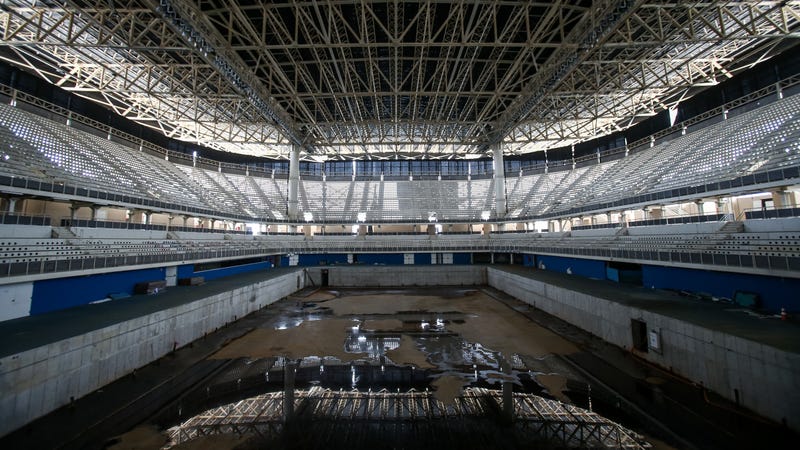What a surprise.

It's very lengthy feature, so there's much more at the jump.
http://www.espn.com/espn/feature/story/_/id/20292414/the-reality-post-olympic-rio

The 2016 Rio Olympics were supposed to be the second of a one-two punch announcing Brazil's arrival as a world power through dominance in sports. But in many ways, the opposite unfolded. Timed with an embarrassing political corruption scandal and the largest economic crisis in Brazil's history, the hosting of the 2014 World Cup and 2016 Games has resulted in a perfect storm of unfulfilled promises.
While 15 of the original 27 venues have hosted some sort of event since the Games, others sit largely abandoned, their decay and disrepair a constant reminder of what was meant to be. Even the iconic soccer stadium, the Maracanã, has been vandalized, and had its power shut off completely after amassing a $950,000 electric bill. Deodoro Olympic Park, long hailed by Brazilian politicians and Olympic proponents as a path to upgrade one of Rio's poorer neighborhoods, is shuttered. The community pool that was supposed to come out of the canoe slalom course was closed in December and has yet to re-open. Brazil's Federal Court of Audit (TCU) reported last week that another abandoned pool, at the Deodoro Aquatics Center, is now covered in bugs, mud and rodent feces. A Deodoro elevator once used to lift fans over a busy road now leads to nowhere.
Ten miles away at the Olympic Park, things aren't much better. Earlier this month a fire from a flying lantern torched the roof of the Rio velodrome, badly damaging its Siberian Pine track. After the Games, the city solicited bids for private companies to run the park, but no one bid, leaving Brazil's Ministry of Sport with the task -- and expense. The maintenance alone will cost the government approximately $14 million this year. Rio's new mayor, Marcelo Crivella, has scrapped plans to turn the handball arena into four public schools. And the 31 towers that made up the athletes village, which were set to be transformed into luxury condos, now sit largely vacant. Even some of the medals awarded to the athletes have tarnished or cracked, with more than 10 percent of them sent back to Brazil for repair. Rio officials blame poor handling by the athletes.
Almost a year since the Games closed, the Rio 2016 Organizing Committee still owes $40 million to creditors. Bloomberg reported in April that the Olympic organizers were attempting to pay creditors with air conditioners, portable energy units and electrical cables. In July, the organizing committee asked the International Olympic Committee for help with its debt; the IOC said no.
Promises that the Olympics would modernize Rio and make its streets safer and favelas cleaner have also failed. According to Brazil's Institute of Public Safety, street robberies are up 48 percent and deadly assaults by 21 percent, to the highest rates since 2009. In the first three months of 2017, violent crime spiked 26 percent compared with the same period in 2016. The state of Rio is still unable to pay its teachers, hospital workers, police and other public employees on time, if at all. Many favelas still lack running water or proper sewage removal. "The promised legacy of the Olympics achieving a safe city for all people was not delivered," Amnesty International wrote in its September 2016 post-Rio report. "Instead a legacy of human rights violations endures."
Largely overlooked through much of the post-Rio commotion are the Brazilian athletes ... Sponsors have dried up. Elite coaches have fled the country. Training centers have closed. And athletes wonder how -- or even if -- they're still going to be able to compete.
[Bronze medalist, open water swimmer Poliana Okimoto's] competitive life is now filled with confusion. With every stroke, she feels the effects of the financial crisis and corruption scandal.
In September, her sponsorship contract ended and was not renewed. Now she pays her team using the $1,000 she receives from the army, her own $4,800 monthly government stipend and money she receives from her club team, Unisanta. (For contractual reasons, the club will not disclose Poliana's compensation.) She still trains at the same 25-meter Esperia Club pool in São Paulo where she and her husband pay roughly $160 a month to be members. There is no competitive team at the club, meaning it's perfectly normal for Okimoto to train in one pool while elderly women take water aerobics classes in another.
To train at Unisanta, which is located in Santos, a coastal city some 50 miles from São Paulo, Okimoto would have had to move and share the pool with her biggest rival, Ana Marcela Cunha. It's a situation neither of them wanted. This summer, Poliana didn't even make the Brazilian world championship team, while Cunha won gold in the 25K, bronze in the 5K and tied for bronze in the 10K.
"I dreamt about the Olympic medal since I was 13 years old," Okimoto says. "I thought it would change my life, or at least my life would be easier. Nothing has changed. On the contrary, I've lost. A lot."
It's very lengthy feature, so there's much more at the jump.
http://www.espn.com/espn/feature/story/_/id/20292414/the-reality-post-olympic-rio

